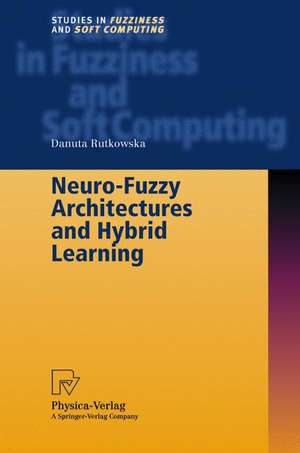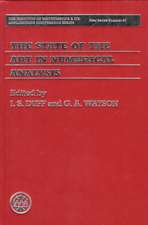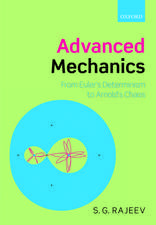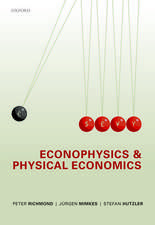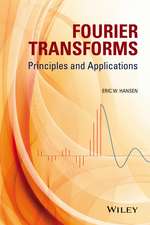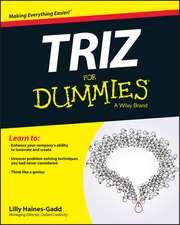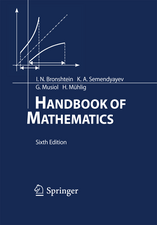Neuro-Fuzzy Architectures and Hybrid Learning: Studies in Fuzziness and Soft Computing, cartea 85
Autor Danuta Rutkowskaen Limba Engleză Hardback – 14 dec 2001
| Toate formatele și edițiile | Preț | Express |
|---|---|---|
| Paperback (1) | 987.32 lei 43-57 zile | |
| Physica-Verlag HD – 21 oct 2010 | 987.32 lei 43-57 zile | |
| Hardback (1) | 993.93 lei 43-57 zile | |
| Physica-Verlag HD – 14 dec 2001 | 993.93 lei 43-57 zile |
Din seria Studies in Fuzziness and Soft Computing
- 20%
 Preț: 999.85 lei
Preț: 999.85 lei - 20%
 Preț: 653.06 lei
Preț: 653.06 lei - 20%
 Preț: 872.98 lei
Preț: 872.98 lei - 20%
 Preț: 930.57 lei
Preț: 930.57 lei - 20%
 Preț: 1051.00 lei
Preț: 1051.00 lei - 20%
 Preț: 992.44 lei
Preț: 992.44 lei - 20%
 Preț: 655.85 lei
Preț: 655.85 lei - 20%
 Preț: 1001.86 lei
Preț: 1001.86 lei - 18%
 Preț: 954.14 lei
Preț: 954.14 lei - 20%
 Preț: 330.10 lei
Preț: 330.10 lei - 20%
 Preț: 333.04 lei
Preț: 333.04 lei - 20%
 Preț: 997.56 lei
Preț: 997.56 lei -
 Preț: 391.61 lei
Preț: 391.61 lei - 20%
 Preț: 647.79 lei
Preț: 647.79 lei - 20%
 Preț: 986.01 lei
Preț: 986.01 lei - 18%
 Preț: 958.56 lei
Preț: 958.56 lei - 20%
 Preț: 996.40 lei
Preț: 996.40 lei - 20%
 Preț: 999.35 lei
Preț: 999.35 lei - 15%
 Preț: 646.43 lei
Preț: 646.43 lei - 20%
 Preț: 651.57 lei
Preț: 651.57 lei - 20%
 Preț: 997.89 lei
Preț: 997.89 lei - 15%
 Preț: 641.03 lei
Preț: 641.03 lei - 20%
 Preț: 1009.74 lei
Preț: 1009.74 lei - 20%
 Preț: 992.62 lei
Preț: 992.62 lei -
 Preț: 388.72 lei
Preț: 388.72 lei - 18%
 Preț: 1223.43 lei
Preț: 1223.43 lei - 20%
 Preț: 651.42 lei
Preț: 651.42 lei - 18%
 Preț: 951.59 lei
Preț: 951.59 lei - 18%
 Preț: 948.61 lei
Preț: 948.61 lei
Preț: 993.93 lei
Preț vechi: 1242.41 lei
-20% Nou
Puncte Express: 1491
Preț estimativ în valută:
190.25€ • 206.72$ • 159.91£
190.25€ • 206.72$ • 159.91£
Carte tipărită la comandă
Livrare economică 21 aprilie-05 mai
Preluare comenzi: 021 569.72.76
Specificații
ISBN-13: 9783790814385
ISBN-10: 3790814385
Pagini: 308
Ilustrații: XIII, 288 p.
Dimensiuni: 155 x 235 x 22 mm
Greutate: 0.61 kg
Ediția:2002
Editura: Physica-Verlag HD
Colecția Physica
Seria Studies in Fuzziness and Soft Computing
Locul publicării:Heidelberg, Germany
ISBN-10: 3790814385
Pagini: 308
Ilustrații: XIII, 288 p.
Dimensiuni: 155 x 235 x 22 mm
Greutate: 0.61 kg
Ediția:2002
Editura: Physica-Verlag HD
Colecția Physica
Seria Studies in Fuzziness and Soft Computing
Locul publicării:Heidelberg, Germany
Public țintă
ResearchCuprins
1 Introduction.- 2 Description of Fuzzy Inference Systems.- 2.1 Fuzzy Sets.- 2.2 Approximxate Reasoning.- 2.3 Fuzzy Systems.- 3 Neural Networks and Neuro-Fuzzy Systems.- 3.1 Neural Networks.- 3.2 Fuzzy Neural Networks.- 3.3 Fuzzy Inference Neural Networks.- 4 Neuro-Fuzzy Architectures Based on the Mamdani Approach.- 4.1 Basic Architectures.- 4.2 General Form of the Architectures.- 4.3 Systems with Inference Based on Bounded Product.- 4.4 Simplified Architectures.- 4.5 Architectures Based on Other Defuzzification Methods.- 4.6 Architectures of Systems with Non-Singleton Fuzzifier.- 5 Neuro-Fuzzy Architectures Based on the Logical Approach.- 5.1 Mathematical Descriptions of Implication-Based Systems.- 5.2 NOCFS Architectures.- 5.3 OCFS Architectures.- 5.4 Performance Analysis.- 5.5 Computer Simulations.- 6 Hybrid Learning Methods.- 6.1 Gradient Learning Algorithms.- 6.2 Genetic Algorithms.- 6.3 Clustering Algorithms.- 6.4 Hybrid Learning.- 6.5 Hybrid Learning Algorithms for Neuro-Fuzzy Systems.- 7 Intelligent Systems.- 7.1 Artificial and Computational Intelligence.- 7.2 Expert Systems.- 7.3 Intelligent Computational Systems.- 7.4 Perception-Based Intelligent Systems.- 8 Summary.- List of Figures.- List of Tables.- References.
Textul de pe ultima copertă
The main idea of this book is to present novel connectionist architectures of neuro-fuzzy systems, especially those based on the logical approach to fuzzy inference. In addition, hybrid learning methods are proposed to train the networks. The neuro-fuzzy architectures plus hybrid learning are considered as intelligent systems within the framework of computational and artificial intelligence. The book also provides an overview of fuzzy sets and systems, neural networks, learning algorithms (including genetic algorithms and clustering methods), as well as expert systems and perception-based systems which incorporates computing with words.
Caracteristici
Novel neuro-fuzzy architectures and hybrid learning algorithms Overview of early and latest results concerning neural networks and fuzzy sets and systems Includes supplementary material: sn.pub/extras
